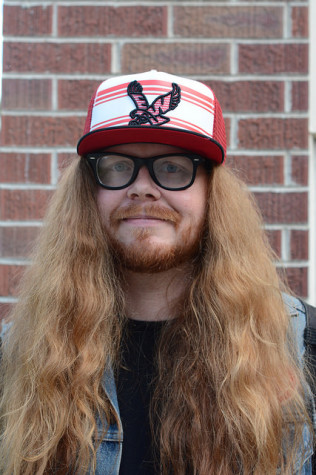Undergraduate student uses personal experience to guide stuttering research

April 9, 2014
During her sophomore year at EWU, Tiffani Kittilstved was told that she could never become a speech therapist. The reason? She stutters.
“I stutter,” Kittilstved said. “I’m not a communications disorders major because someone told me that I couldn’t be a speech therapist because I stutter. That’s why I did anthropology with an emphasis in linguistics.”
At the 2014 Northwest Anthropological Conference, held March 26-29 in Bellingham, Wash., Kittilstved presented research she did on the public’s perceptions of stuttering.
Kittilstved made the trip to Bellingham with nine other students and Eastern anthropology professor Dr. Julia Smith. Smith is also the EWU Anthropological Society’s adviser and Kittilstved’s research mentor.
“It’s a great experience for students,” Smith said. “I wanted to be there to support them, help them and make sure they have a great experience.”
Kittilstved, who is the president of the EWU Anthropological Society, said when Smith told her and other students to submit their research for the upcoming spring conference, she knew exactly what she wanted to do.
“I stuttered worse as a child,” Kittilstved said. “My twin brother and I both stuttered. But we would talk to each other and understand each other when no one else did.
“My dad has frontal lobe brain damage. He’s really irrational, doesn’t understand that stuff sometimes and gets angry. So, growing up, he used to yell at me when I stuttered,” Kittilstved said. “So, I started covertly stuttering. I mastered the art of covering it up.”
Although there is already extensive research on the negative perception of stutterers, Kittilstved said she wanted to see if anything had changed.
According to the research Kittilstved reviewed, people who stutter are often seen as less intelligent, anti-social, introverted, non-hygienic, unattractive and unable to succeed in life.
“Those perceptions have been around for decades and haven’t shown a huge change,” Kittilstved said. “To start my research, I interviewed about seven people from EWU, about 10 hours of research, just to see if they had the same the perceptions that the subjects from the literature had. And they did.”
During winter quarter, Kittilstved surveyed 450 students at Eastern. She split the students into a control group and an experimental group. The control group got the survey and had the chance to share their perceptions of people who stutter. The experimental group got a speech written by Kittilstved about what stuttering is.
“Past studies have shown that this improves perceptions. How they think of you, and how they deal with you,” Kittilstved said. “I gave them a lot of basic information, to see if it improved their perceptions, but there was no statistically significant change.”
According to Kittilstved, the reason it was so important to present her research was not just to tell people about stuttering, but how to react to stutterers. She said her hope is that by giving people information about stuttering, their perceptions will improve.
“The greater implication of my research is that stutterers are limited in life,” Kittilstved said. “There are countless cases of people who don’t excel in life and don’t fulfill their dreams because someone else limits them.”
Smith said Kittilstved and the other students from Eastern had a great set of presentations.
“These conferences are really important for students,” Smith said, “It lets them build a set of skills they’ll need to be successful, whether we are talking about graduate school or work. It gives them the ability to look at a problem, solve it, and then present it either orally or in writing in ways that allow them to show off their best. I thought my students were pretty amazing.”
Kittilstved is not letting stuttering hold her back. She found out she was accepted to graduate school March 7, 2014, just before her 19th birthday, last Friday, April 4. This fall, she will begin the Master of Science in Speech Pathology program at the University of Tennessee.
“I’m really excited to be beginning a new chapter of my life, and to continue researching stuttering” Kittilstved said. “The professor I’m studying with is working a lot with the neurology of stutterers, and looking for neurological causes of stuttering. That’s the stuff I want to research.”








